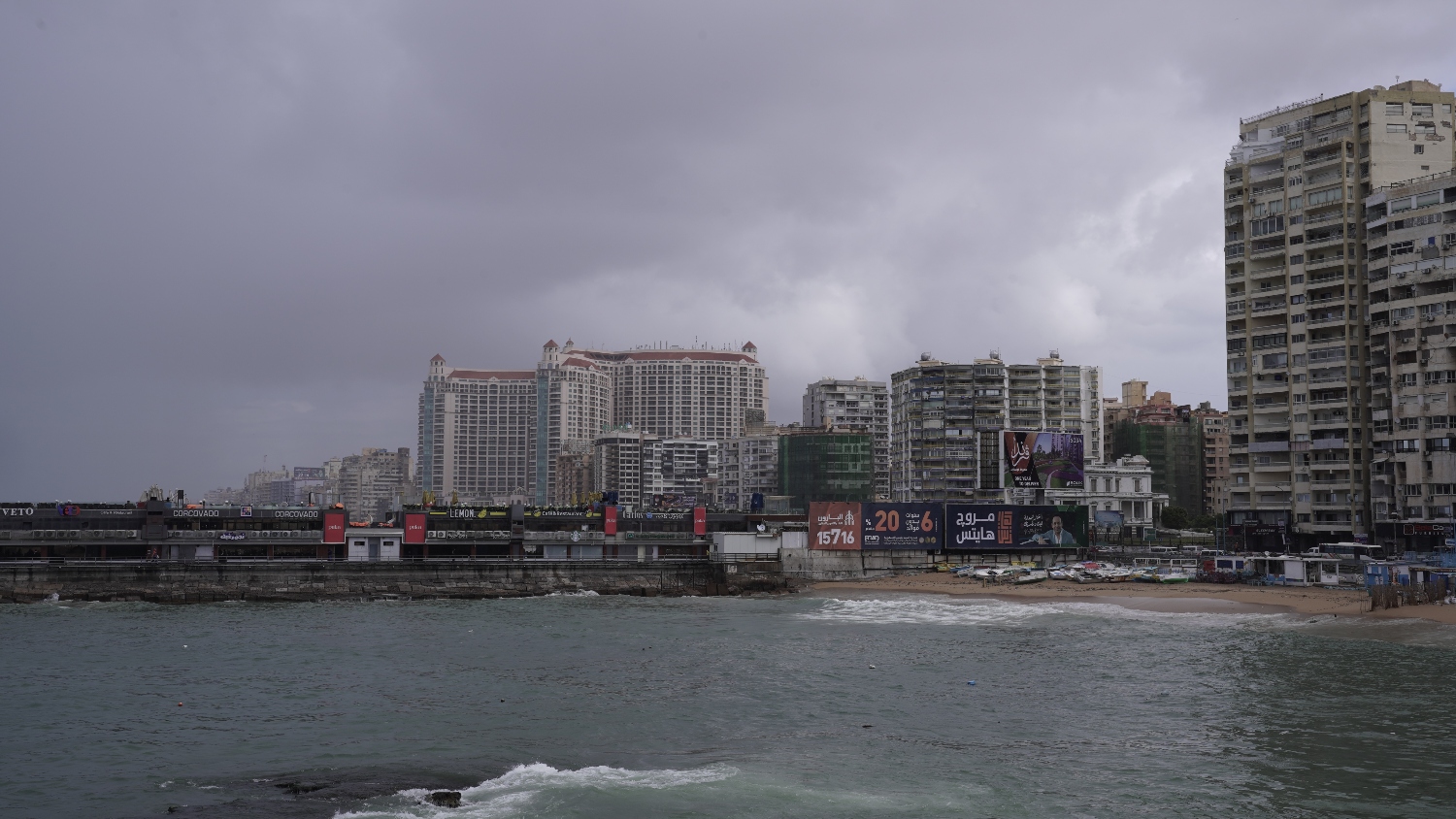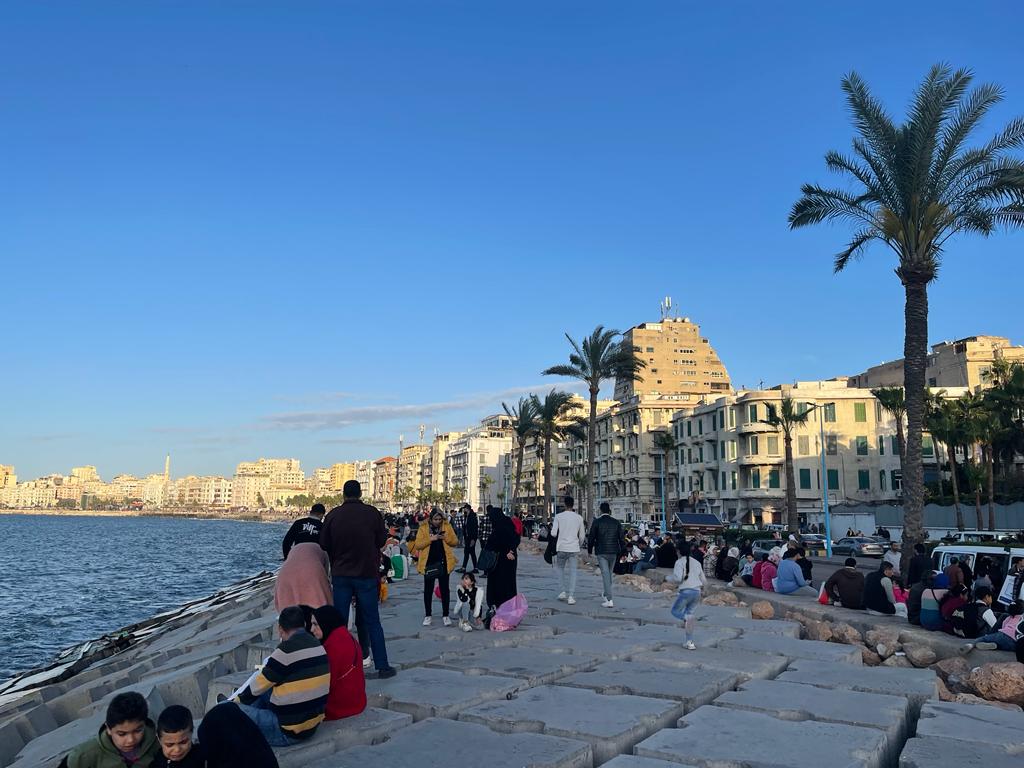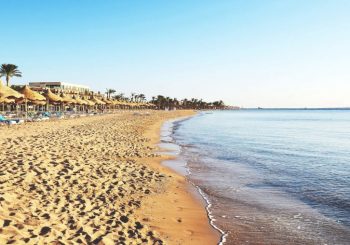“Catastrophic,” is how Mohamed Dessouki, a campaigner, heritage enthusiast, and Assistant Professor of Architecture at the Arab Academy for Science and Technology (AAST) chose to describe the changes to Alexandria’s corniche in recent years.
‘The Pearl of the Mediterranean’ and ‘The Mermaid of the Mediterranean’ are only some of the names given to the city of Alexandria. Yet, today, this is not how Alexandrians picture the once-beautiful city.
As the second largest city in Egypt, Alexandria is home to Egypt’s main seaport and was once a popular summer holiday destination. The corniche, one of its most distinctive features, if not the most distinctive, is the main waterfront road that runs along Alexandra’s coastline.
The Corniche: Between Past and Present
Several articles claim that the Alexandria corniche was built over ten years. However, the corniche we know today was completed in 1934. The 20-kilometer-long seacoast promenade extends from El Montazah Palace in the east to Ras El Teen Palace in the west.
According to Ahram, between 1986 and 1997, the Governorate of Alexandria was headed by Ismail El-Gawsaqi. During his time as governor, he decided that the seaview should be available to everyone and that there would be no buildings or fences obstructing public view. Following this decision, he demolished most beach cabins that were built in previous years.
As it overlooks the Mediterranean Sea, the corniche was always one of the top tourist and local attractions in the city. Due to traffic congestion, overpopulation, and urban development, the corniche witnessed repetitive changes causing it to change from its initial form which Alexandrians were used to.
Today, restaurants and cafes stand as a barrier between Alexandrians and their once open sea view.
A Loss of Identity and Cultural Heritage
The sea is a central element of the identity of most Alexandrians. Whether for work, like fishermen, or for enjoying the view, the sea is an integral part of their daily lives.
In a short visit to Alexandria, Egyptian Streets spoke to taxi drivers, passersby, and fishermen about the corniche between the past and the present. Disappointment and frustration was the overarching theme of most conversations. However, all these conversations were off-record, as many feared the consequences of voicing their opinions publicly.
“For Alexandrians, as well as anyone visiting Alexandria, the corniche is the most important part of the city,” Dessouki tells Egyptian Streets. “In all the social media groups related to Alexandria, you can always sense a feeling of collective sadness and anger at the situation, it isn’t just my personal opinion.”
With a passion for the architecture and history of Alexandria, Dessouki worked with the National Organization for Urban Harmony (NOUH), aimed at beautifying the exterior image of buildings and monuments, as well as The Alexandria Preservation Trust (APT), dedicated to the protection of Alexandria’s cultural heritage.
Dessouki was also one of the cofounders of ‘Save Alex’, an initiative created by a group of volunteers advocating for the preservation of Alexandrian heritage and the demolition of historical buildings. Today, the initiative is inactive, mostly because, according to Dessouki, any kind of activism is not welcomed in the country nowadays.
Frustrated about the changes that took place to the city he belongs to, Dessouki describes these changes as “violations”.
“I call them violations because none of this is legal,” Dessouki argues. “This is a public space, owned by the public, who all deserve to have this open space whether to enjoy it as a beach or to at least see it from afar. This is a form of privatization of the public domain. Today, there are very few places, more like small gaps, where people can still sit by the corniche. The rest have been rented or sold.”
According to article 45 of the Egyptian constitution, “The state commits to protecting its seas, beaches, lakes, waterways, groundwater, and natural reserves. It is prohibited to encroach upon, pollute, or use them in a manner that contradicts their nature. Every citizen has the right to enjoy them as regulated by law. ”
“Legally, the people of the city own the right to enjoy these public spaces without being forced to sit at a restaurant or cafe and pay money,” Dessouki continues. “It is no one’s right to privatize any part of a public place. There are now barriers and commercial activities almost extending across the entire corniche, it’s tragic!”
In the past few years, there have been many voices echoing Dessouki’s sentiments. Between construction of unnecessary tunnels, numerous cafes and restaurants, and garage spaces, Alexandrians felt like their right as citizens to their beloved seafront city was being taken away bit by bit.
“People need a breath of fresh air. Even in the poorest countries, a public space is where people exercise their right — children play, musicians play music, and adults enjoy a relaxing view,” Dessouki says with a sigh.
However, there have been those who applaud the state’s efforts in expanding the city’s roads and developing the long-lived corniche.
Development or Destruction?
“Each time in history has its own complications and necessities, and Alexandria’s identity definitely changed over the years. Changes happen in every city and only time can tell if these changes were positive or negative,” Khaled El-Sayed Darwish, Owner of Cafe de la Paix, Philip House Hotel, and Miramar Boutique Hotel, tells Egyptian Streets.
With multiple businesses in the metropolitan city, Darwish believes that having cafes by the corniche is an addition to the city. Nevertheless, he does not support having too many cafes in one place as that can ruin the initial idea.
“If I cannot sit in this place, other people can. These cafes were made for the people of Alexandria, and many do visit and enjoy sitting in them. We cannot base our judgements only on cost and prices, there are other factors that are important like the aesthetic of the place and the ambiance,” Darwish argues.
While many insist that fewer places are now available for free, Darwish disagrees.
“Camp Shizar, El Ibrahimeya, El Shatby, and more, are all places where people can still sit by the corniche freely, without having to sit in cafes,” Darwish says.
Meanwhile, groups and campaigns on social media have repeatedly called for an end to continuous construction work on the corniche, depriving citizens of the opportunity to sit by the sea.
In response to these arguments and claims, Darwish suggests that this “blockage” may only be for those walking on the streets, but for those who live by the corniche, or reside at a hotel overlooking the corniche, they can clearly see the view.
“With the height of hotel towers now and the rising of the land level above sea level, there are no buildings blocking the view across the entire corniche, except in Sidi Gaber,” Darwish notes.
Cafes, Restaurants, and Parking Lots

Photo credit: Fat’hia El Sisi
In 2015, the governorate of Alexandria initiated a decree to demolish parts of the corniche in the area opposite the Courts Complex in El Mansheya district. The project was aimed at creating parking spaces for the lawyers and judges working in the complex. However, angry reactions from the public forced the governorate to retreat and cancel the project.
For years, public beaches made up a huge part of life in Alexandria. This is why Alexandrians were furious when El Shatby public beach was transformed into a parking space in 2017.
Another area that witnessed significant change is Gleem, an area in the east of the city. On the side of the corniche in Gleem, there was a promenade, called Lesan (tongue), extending further within the sea.Then, in 2020, Gleem was transformed into Gleem Bay, an area packed with cafes and restaurants.
“Lesan was a place where we used to walk literally in the middle of the water, and enjoy the beautiful and relaxing view — for free. Lots of fishermen used to work there too,” Karim*, a source, speaking on the condition of anonymity, recalls.
Dessouki agrees.
“Gleem [used to be] a place where hundreds of families went to spend time together, and fishermen went to fish. Today, it is called Gleem Bay, a place full of cafes and restaurants in the middle of the water,” Dessouki explains.
Reminiscing about Alexandria in the Past

An Alexandrian undergraduate student in his early twenties, Karim reminisces about his childhood in Alexandria, and how as the years passed by, the city he grew up in was transformed into one he barely recognizes.
“[My friends and I] used to go to the corniche to play football in the sand; it was like our public gym,” Karim tells Egyptian Streets. “We even used to get our breakfast from home and have it there. All this disappeared, nothing is free anymore — the sidewalk on the corniche has either become a place for a cafe or a hotel-owned area.”
Karim is quick to clarify that he is not against the establishment of cafes, rather their over-establishment. He admits that there are still a few places that are free, but they are either crammed with people because they are few, or are really far from where he resides.
“The sea was available for Alexandrians everywhere. I used to go for a 15 minute break [to sit by the sea] and come back. It’s impossible for me to do that now, it’s inconvenient,” Karim explains.
“The ‘corniche’ is a term I never used. All of us used to say ‘the sea’, but now it is not understandable when you say the sea, are you inside a cafe or by the sidewalk or in the sand. We used the term ‘sea’ because the entire area, from the sidewalk onwards, is the sea for us,” Karim continues.
Like many young Alexandrians, Karim recalls a time when he sat by the sea to meditate, to watch the sunset, to sit and reflect, or simply to enjoy the breathtaking view with no barriers.
“I wish I was able to write a letter with all that is bothering me about the changes they made to the city, and send it to the governor of Alexandria, without having to hide my name,” Karim says. “It shouldn’t be so hard.”
As the economic situation across the country worsens, and with no escape for citizens to catch a breather, many consider leaving the city, sometimes even the country, in search of better opportunities.
Once an escape for residents of the beautiful city, the sea has become yet another reason for their agony and frustration. Instead of being a place for them to unwind and relax, it only serves as a reminder of what used to be.
“I cannot leave, I cannot abandon Alexandria. Leaving my city is like betraying it, and I cannot do that. But still, I feel like I’m paralyzed,” Karim says.
(*=name changed due to security concerns)
Subscribe to the Egyptian Streets’ weekly newsletter! Catch up on the latest news, arts & culture headlines, exclusive features and more stories that matter, delivered straight to your inbox by clicking here.






Comments (0)